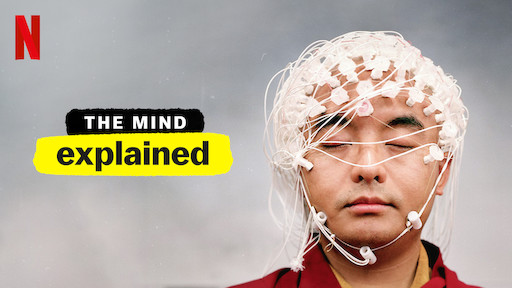

The Mind, Explained – first released on 12th September 2019, on Netflix – does a decent job at bridging the gap between scientific and laymen psychology. The series focuses on ‘hot’ psychological topics such as memory, dreams, anxiety, mindfulness and psychedelics. They are entertaining, educational and bitesize, with a duration of about twenty minutes an episode. As this series is done by Vox, you’ll find the style of the videos familiar if you have watched other videos by Vox on YouTube or Netflix. The psychological explanations in The Mind, Explained are rather accurate and consistent with what is taught in the first year of our bachelor program, specifically for the episodes on memory, dreams and anxiety. The visual effects in the videos are pleasing and enhance one’s understanding of the concepts discussed. In each stand-alone episode, Emma Stone’s voice takes you on a journey from the current views on the topic to its history, to the current research and uses for it, and to what the future may hold. The episodes are also interspersed with guest speakers who share their personal experiences or who are experts in the field. Credit goes to Adam Cole (main producer) and his team for creating such an insightful and enjoyable series.
To give a brief run-through of each episode, without giving away too much, the episode on memory sheds light on the unreliability of one’s memory and how it can be easily distorted by others and even by one’s mind. It also briefly touches on how memory works in relation to the brain. For dreaming, the episode explains the sleep cycle, gives a brief overview of the discussions on the meaning of dreams and delves into lucid dreaming. In the episode on anxiety, the different categories and types of anxiety are explained, as well as where anxiety stems from and the effectiveness of different types of treatments. The show also addresses how depression and obsessive-compulsive disorder may be comorbid with anxiety. The mindfulness episode digs into the origins of mindfulness, its mechanism in relation to the brain, and its effects. Lastly, the episode on psychedelics discusses a few kinds of psychedelics and their effects, as well as, touching upon the controversy surrounding the use of psychedelics which is closely linked to the history of psychedelics – how the idea of psychedelics was misused and wrongly linked to undesired societal occurrences. They also share some information on the dangers and benefits of using psychedelics.
I appreciated the relatively balanced view presented in the videos. For instance, in the video on anxiety, they discussed both the psychological and chemical methods that are used to aid people suffering from anxiety but they do state that some of these treatments have serious side effects and that these treatments may not fully solve the issues. It is therefore important, for people unfamiliar with these psychological topics, to watch these videos in their entirety – leaving with an incomplete view of the topic could have undesirable consequences through believing or spreading biased information. For those who have moderate to extensive knowledge on these topics, it is a nice video to watch, but for those who do not know much of and are curious about these topics, I recommend these videos as a starting point for learning more. Personally, the video on psychedelics was an eye-opener for me as I come from a country where drugs are almost never discussed, unless it is in the context of ‘drugs are bad’ and ‘don’t do drugs’, which to me made drugs into something akin to a unicorn. The video has piqued my interest to learn more about the ‘good’ and ‘bad’ sides of taking drugs. For me, the only critique about this series is that they only touch the surface of these topics. That said, there is only so much one could include in these relatively short videos. So, if you’re looking for a summarized introduction of these five topics, you’re in the right place, but if you’re looking to understand the topic inside out, maybe a more in-depth documentary or doing your own research would be preferable.
This docuseries is out now on Netflix.

The Mind, Explained – first released on 12th September 2019, on Netflix – does a decent job at bridging the gap between scientific and laymen psychology. The series focuses on ‘hot’ psychological topics such as memory, dreams, anxiety, mindfulness and psychedelics. They are entertaining, educational and bitesize, with a duration of about twenty minutes an episode. As this series is done by Vox, you’ll find the style of the videos familiar if you have watched other videos by Vox on YouTube or Netflix. The psychological explanations in The Mind, Explained are rather accurate and consistent with what is taught in the first year of our bachelor program, specifically for the episodes on memory, dreams and anxiety. The visual effects in the videos are pleasing and enhance one’s understanding of the concepts discussed. In each stand-alone episode, Emma Stone’s voice takes you on a journey from the current views on the topic to its history, to the current research and uses for it, and to what the future may hold. The episodes are also interspersed with guest speakers who share their personal experiences or who are experts in the field. Credit goes to Adam Cole (main producer) and his team for creating such an insightful and enjoyable series.
To give a brief run-through of each episode, without giving away too much, the episode on memory sheds light on the unreliability of one’s memory and how it can be easily distorted by others and even by one’s mind. It also briefly touches on how memory works in relation to the brain. For dreaming, the episode explains the sleep cycle, gives a brief overview of the discussions on the meaning of dreams and delves into lucid dreaming. In the episode on anxiety, the different categories and types of anxiety are explained, as well as where anxiety stems from and the effectiveness of different types of treatments. The show also addresses how depression and obsessive-compulsive disorder may be comorbid with anxiety. The mindfulness episode digs into the origins of mindfulness, its mechanism in relation to the brain, and its effects. Lastly, the episode on psychedelics discusses a few kinds of psychedelics and their effects, as well as, touching upon the controversy surrounding the use of psychedelics which is closely linked to the history of psychedelics – how the idea of psychedelics was misused and wrongly linked to undesired societal occurrences. They also share some information on the dangers and benefits of using psychedelics.
I appreciated the relatively balanced view presented in the videos. For instance, in the video on anxiety, they discussed both the psychological and chemical methods that are used to aid people suffering from anxiety but they do state that some of these treatments have serious side effects and that these treatments may not fully solve the issues. It is therefore important, for people unfamiliar with these psychological topics, to watch these videos in their entirety – leaving with an incomplete view of the topic could have undesirable consequences through believing or spreading biased information. For those who have moderate to extensive knowledge on these topics, it is a nice video to watch, but for those who do not know much of and are curious about these topics, I recommend these videos as a starting point for learning more. Personally, the video on psychedelics was an eye-opener for me as I come from a country where drugs are almost never discussed, unless it is in the context of ‘drugs are bad’ and ‘don’t do drugs’, which to me made drugs into something
akin to a unicorn. The video has piqued my interest to learn more about the ‘good’ and ‘bad’ sides of taking drugs. For me, the only critique about this series is that they only touch the surface of these topics. That said, there is only so much one could include in these relatively short videos. So, if you’re looking for a summarized introduction of these five topics, you’re in the right place, but if you’re looking to understand the topic inside out, maybe a more in-depth documentary or doing your own research would be preferable.
This docuseries is out now on Netflix.



